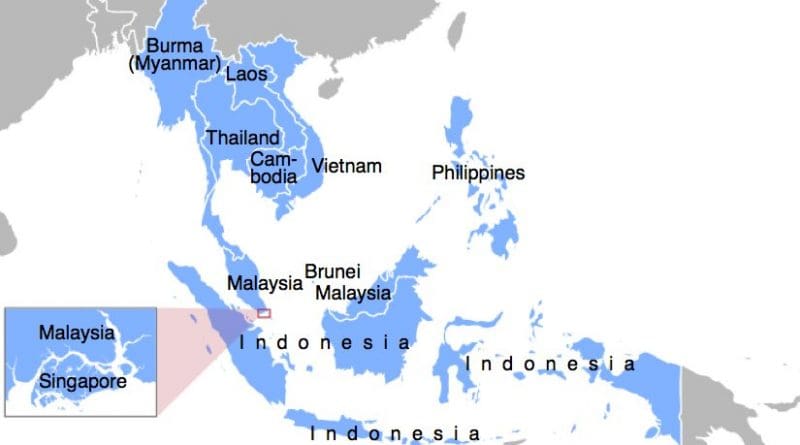ASEAN Agrees To Anti-Terror Cooperation, Guidelines On Air Encounters
By BenarNews
By Dennis Jay Santos and Ahmad Syamsudin
The ASEAN bloc and its dialogue partners wrapped up defense talks in Singapore at the weekend by agreeing to establish guidelines against unplanned air encounters and to boost anti-terror cooperation, officials said Monday.
Meanwhile on Monday, about 1,000 naval personnel from member states of the Association of Southeast Asian Nations (ASEAN) embarked on their first joint maritime training exercises with the Chinese military off China’s southern coast and far from disputed areas in the South China Sea, news reports said.
During meetings in Singapore that ended on Saturday, the 10-nation regional bloc adopted an Indonesia-driven initiative dubbed “Our Eyes,” a platform to share intelligence in countering violent extremism across Southeast Asia, according to Jakarta’s defense ministry.
“Today, the region recognizes that international cooperation, especially in terms of exchange and information sharing, is an important element in combating terrorism,” the ministry said in a statement.
“The increasing threat from an IS nucleus in the Philippines, along with the threat of foreign combatants returning from the theatre in the Middle East, Africa and Asia has led to the need to work together in the fields of defense, military, law enforcement and intelligence to be far more important than ever,” it said, using the acronym for the extremist group that calls itself Islamic State.
The United States, New Zealand and Japan have expressed interest in officially joining the “Our Eyes” initiative, and have pledged assistance in developing it.
The Indonesian foreign ministry said the initiative was meant to “revolutionize” counter-terrorist efforts by Southeast Asian countries. The joint effort is envisioned to increase cooperation among intelligence branches of each country, as well as block militant-recruitment efforts.
Already, joint patrols involving the Philippine and Indonesian navies have lowered the terror threat in the region, the ministry said.
“There will be challenges to work together, but the desire of government leaders to overcome traditional barriers and expand international cooperation has the potential to change the counter-terrorism landscape in Asia, by preventing incidents like Marawi from happening again,” the statement said.
Last year, pro-IS militants led by Filipino Isnilon Hapilon laid siege to the city of Marawi in the southern Philippines, provoking a five-month battle that left an estimated 1,200 people dead, mostly militants.
Faced with seemingly unending enemy firepower, Philippine President Rodrigo Duterte accepted help from the United States and Australia, which provided intelligence data that proved vital to winning the battle of Marawi. It was officially declared over on Oct. 23, 2017.
But dozens of enemy fighters escaped the city and, according to Philippine intelligence officials, they have been recruiting younger fighters in remote areas of the south.
Air guidelines
In Singapore, the ASEAN defense ministers as well as their counterparts from other countries agreed in principle to adopt what is perhaps the world’s first multilateral set of “guidelines for air military encounters,” according to a joint statement issued Saturday.
All the countries “agreed to explore the collective application” of these guidelines, which are meant to enhance aviation safety “in light of increased congestion in the air,” the statement said.
U.S. Defense Secretary Jim Mattis and his Chinese counterpart, Gen. Wei Fenghe, were among eight defense chiefs from outside ASEAN to back the guidelines “in principle,” a joint ministerial statement said.
Ng Eng Hen, Singapore’s defense minister, said the new guidelines were aimed at preventing any escalation of confrontations in the South China Sea.
“You can have a gung-ho pilot who switches off everything and decides, ‘I’m going to intimidate,’” Eng told reporters, according to Agence France-Presse. “That would be a disaster.”
The agreement is the latest effort to avoid military confrontations in the South China Sea, amid concerns over Beijing’s increasing assertiveness in the maritime region.
China had agreed earlier with ASEAN to a draft “code of conduct” to govern actions in the region, regarded as a positive development by many despite Beijing’s ongoing militarization efforts in the sea, where China and some other countries have contending territorial claims.
These developments have worried the United States, which has recently conducted freedom of navigation flights and sailing in the South China Sea, a major trade route where more than U.S. $5 trillion moves through each year.
Joint drills
On Saturday, meanwhile, China kicked off a 10-day trilateral training exercise with Thailand and Malaysia in the Strait of Malacca off Malaysia, marking the first time the three nations held military drills together at the gateway to the Indian Ocean.
According to a statement from Malaysia’s defense ministry, Malaysian participants in the drills on Monday demonstrated survival skills and shared their experience about trapping wild animals. Participants also went through sniper training, it said.
The Strait of Malacca is a chokepoint between the southern Pacific Ocean and the Indian Ocean. An official in Indonesia, whose Sumatra island borders the Strait of Malacca, said authorities were aware of the trilateral exercise.
At the same time on Monday, the Singaporean Navy and the People’s Liberation Army Navy co-hosted the first-ever naval drills between China and all 10 ASEAN countries that kicked off near the Chinese port city of Zhanjiang, according to reports.
The exercises off China will go on till Oct. 27 and involve more than 1,000 personnel from the Chinese navy and navies of all ASEAN states, the Singaporean Ministry of Defense said in a statement.
The exercises would “enhance friendship and confidence between ASEAN member states’ navies and the People’s Liberation Army Navy and the U.S. Navy,” the defense ministers of the regional bloc said in a joint statement, according to the Associated Press.
Zam Yusa in Kuala Lumpur contributed to this report.

